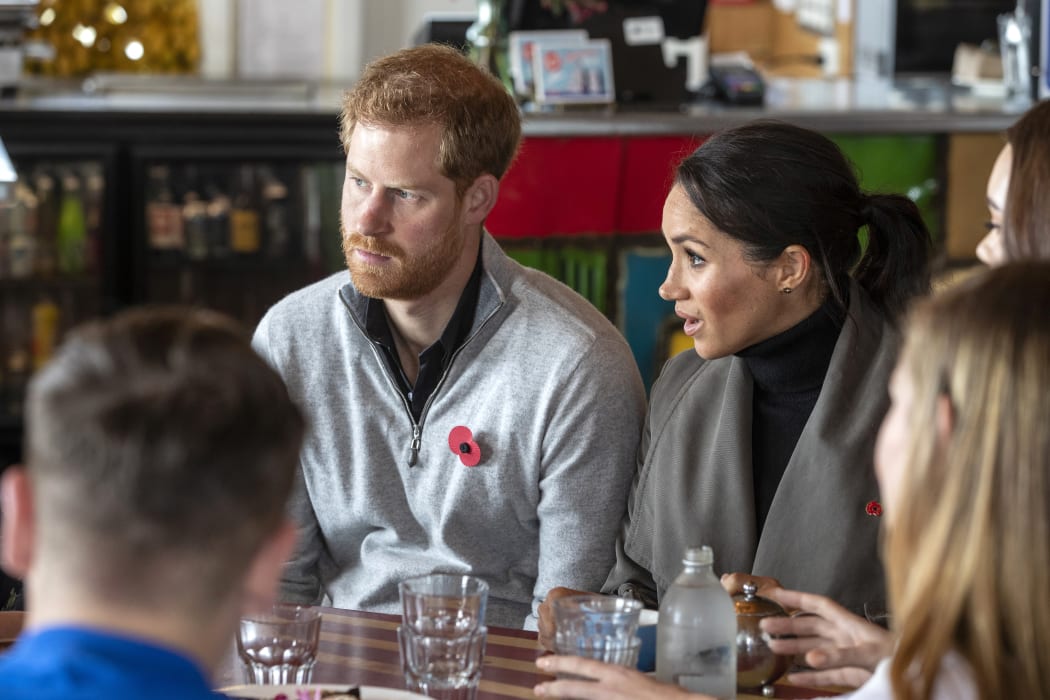By Claire Henry
In the wake of the royals' whirlwind Wellington visit, it is worth taking pause to consider a valuable question Prince Harry raised with youth mental health advocates at Maranui Café. What is the role of social media in youth mental health?

Prince Harry and his wife Meghan meet with representatives of mental health projects at Maranui cafe in Wellington. Photo: AFP / Pool
Harry is hardly the first to bring it up, but the royal question is a useful prompt to encourage ongoing national discussion on the impact of social media on youth mental health.
Ezekiel Raui, founder of Tu Kotahi (a peer-support youth suicide prevention programme), was one of the young leaders who met with the Duke and Duchess of Sussex on Monday.
Ezekiel has raised this issue before, telling RNZ: "This is a new world in the sense that social media to a lot of us as rangatahi (youth) is almost a reality… and so how many likes we got on Facebook and those things like Instagram and Twitter is validation.
"It's almost more important to us than having a conversation face to face."
For generations who didn't grow up with social media, it can be difficult to grasp this "new world" where social media is such a large part of many young people's social world and reality.
For older generations, social media may be perceived (and used) as optional, but telling young people "don't go online" is not the simple answer to its hazards.
Social media is an interwoven (almost inevitable) part of young people's lives, and we need to come to grips with how it operates, how it can affect mental health, and how to support young people managing the risks of social media use.
Social media can be a space where harassment and bullying run riot.
Online bullying can cause significant fear, distress, shame, or other negative emotions, to the person it's targeted at.
Since posts on social media can reach many people quickly, can occur at any time, can be anonymous, and can often remain visible, it may feel difficult to escape from.
Another potential harm is the way that other people's curated lives on platforms such as Instagram and Facebook can affect our own sense of worth and value, as can the number of 'likes' on our own posts.
The amount of time spent online can also impact on other areas of life, cutting into time for sleep, study, and relationships, and affecting mood.
The constant immediacy of global news on social media-the way that troubling political and environmental news is always there and waiting for you-can also affect a person's mood and outlook.
While it's important to discuss these potential negative impacts, it is also worth remembering that social media can be harnessed as a positive tool for social support, connecting communities, social activism, sharing resources and information, and as a platform for organisations and initiatives that are tackling stigma and providing education.
For example, Voices of Hope, founded by Jazz Thornton and Genevieve Mora (who were among the mental health advocates who met with Harry and Meghan), uses online videos, blogs, and social media to offer hope to people struggling with mental health issues and to promote mental well-being and recovery.
We are talking more often and more openly now about mental health here in New Zealand, and there are a range of initiatives-including some amazing youth-led projects-that have been developed to raise awareness and offer support.
The value of the royal visit was not the conversations it may have sparked about Meghan Markle's fashion choices or the classic Kiwi gifts for the next royal baby, but instead, the conversations it has hopefully sparked about youth mental health.
The hype of the royals' visit might be what grabbed our initial attention, but what matters is that it presented an opportunity for local youth-led initiatives to gain a greater platform, and we need to keep paying attention to the voices of our young people leading the way on awareness, education, and advocacy.
Dr Claire Henry is an academic in the School of English and Media Studies at Massey University, Wellington, whose research areas include digital media production, film theory, media literacy, and screen media interventions.
Resources and support for young people
- Netsafe has a range of resources and advice for young people and parents on their website for managing online challenges.
- The Office of Film and Literature Classification has a Parents' Guide and video resources on helping young people deal with challenging media.
- Youthline - 0800 376 633, free text 234 or email talk@youthline.co.nz or online chat
- thelowdown.co.nz - or email team@thelowdown.co.nz or free text 5626
- What's Up - 0800 942 8787 (for 5-18 year olds). Phone counselling is available Monday to Friday, midday-11pm and weekends, 3pm-11pm. Online chat is available from 5pm-11pm 7 days a week, including all public holidays.
- Kidsline - 0800 54 37 54 (0800 kidsline) for young people up to 18 years of age. Open 24/7.
- SPARX.org.nz - online e-therapy tool provided by the University of Auckland that helps young people learn skills to deal with feeling down, depressed or stressed
- Need to talk? Free call or text 1737 any time for support from a trained counsellor
- Lifeline - 0800 543 354 (0800 LIFELINE) or free text 4357 (HELP)
- Suicide Crisis Helpline - 0508 828 865 (0508 TAUTOKO)
- Healthline - 0800 611 116
- Samaritans - 0800 726 666

